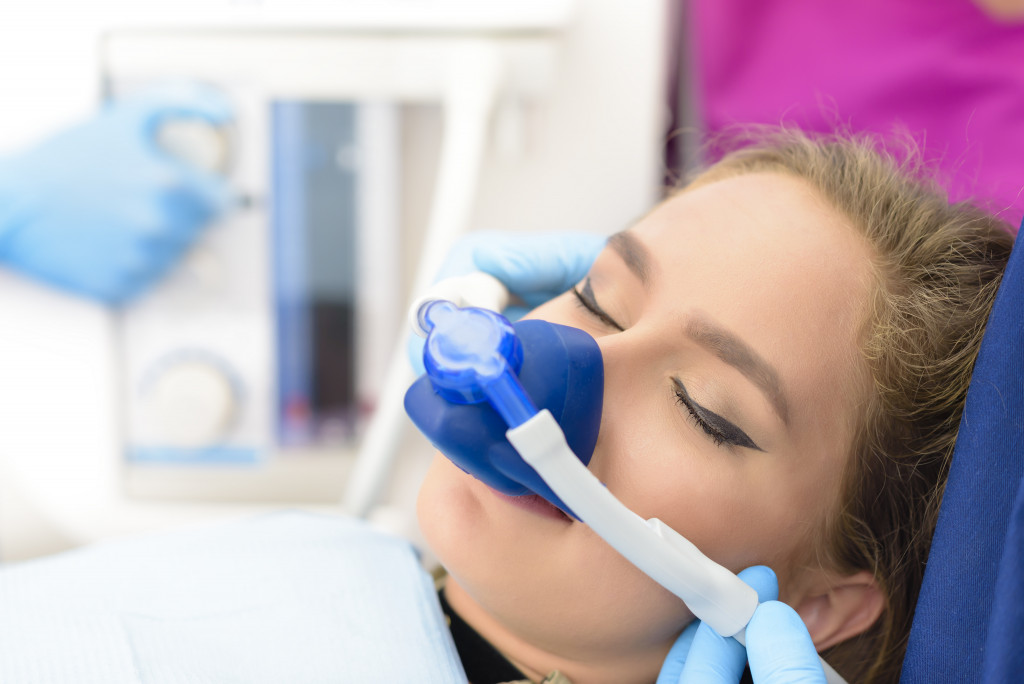- For a visit to the dentist free of stress, it is essential to have open communication between the patient and their dentist.
- Distraction, relaxation, and counseling services can effectively assist in managing dental anxiety.
- When bringing a child to the dentist, it’s important to consider if the dental practice is kid-friendly.
- Taking the time to prepare for your next dental visit can help make it a positive experience.
No one likes the dentist, but it can be terrifying for some people. For those suffering from dental anxiety, even the thought of a routine checkup or cleaning can lead to panic and dread.
Fortunately, there are several techniques and options available that can help make your next visit stress-free. With these strategies in mind, you’ll be able to look forward to your next trip to the dentist instead of dreading it!
Talk to Your Dentist
Proper communication between patients and their dentists ensures a stress-free dental visit. A dentist must understand the patient’s needs and preferences before proceeding with any procedure. Establishing open communication, discussing concerns or fears, and understanding what the patient expects from the visit help create a comfortable environment.
Patients honest about their dental anxiety, past experiences, or medical conditions allow the dentist to make necessary adjustments and recommendations. Communicating effectively, the patient better understands their dental health and treatment options, resulting in a positive experience and better oral health. Therefore, talking to one’s dentist is an essential aspect of dental care that should not be overlooked.
Check Out Available Solutions
Several solutions are available if you suffer from dental anxiety. Here are some tips to help you out:
Opt for Sedation Dentistry

Choosing sedation dentistry is a safe and effective method to reduce dental anxiety and have a comfortable visit without stress. It involves using medication to help patients relax during dental procedures ranging from routine cleanings to more invasive procedures. Choosing the correct form of sedation is important and should be done in consultation with a dental professional experienced in sedation dentistry.
Oral sedatives and nitrous oxide are two commonly used forms; each has benefits and risks. The goal of sedation dentistry is to minimize patient anxiety and discomfort while allowing the dentist to perform the necessary procedures safely, efficiently, and effectively. Importantly, patients who take medication for dental sedation must have a qualified caregiver accompany them home after the procedure, and they should avoid driving or making important decisions for the remainder of the day.
Try Distraction Techniques
Distraction techniques have proven effective in overcoming dental anxiety for those who fear going to the dentist. These techniques involve using fun, calming distractions to take the mind off the fear and the dental work being performed. They can range from listening to music, watching TV or videos, practicing breathing exercises, or simply visualizing a calm and serene place.
By shifting the focus to something more enjoyable and relaxing, the dental visit can become a much more stress-free experience. Incorporating these techniques can make all the difference in creating a positive and comfortable dental visit for those who struggle with dental anxiety.
Practice Relaxation Techniques

Properly practicing relaxation techniques before a dental visit is important for individuals who want a stress-free experience. These techniques involve breathing exercises, progressive muscle relaxation, visualization, and meditation. It is recommended to start practicing them a day or two before the appointment to create a feeling of calmness and relaxation that people might need during their visit.
Doing so can help reduce nerves, lower blood pressure, and provide control over the situation. With regular practice, relaxation techniques can also positively impact a person’s overall mental and physical well-being. Therefore, taking the time to incorporate these methods into one’s daily routine can lead to a much more enjoyable dental experience.
Look Into Counseling Services
To have a stress-free visit to the dentist, it’s crucial to look into counseling services to overcome dental anxiety. Counselors can help patients work through their fears and concerns, and provide them with practical strategies and coping mechanisms to help manage their anxiety during dental procedures.
Seeking counseling services also allows patients to create a personalized treatment plan tailored to their needs and preferences. Additionally, it can help patients develop a positive and comfortable relationship with their dentist, which is essential for regular check-ups and preventative care. By seeking counseling services, patients can take control of their dental anxiety, feel confident in their ability to manage their emotions and have a successful visit to the dentist.
Choose a Kid-Friendly Practice if You Have a Child
Choosing a kid-friendly dental practice is crucial to ensuring children have a positive and stress-free experience during their visits. It is important to note that not all dental practices are created equal, and some may not be suitable for children. A kid-friendly practice is designed to make children feel comfortable, safe, and at ease.
These practices prioritize the child’s overall well-being and may have amenities like colorful decor, games, and toys to entertain young patients. Additionally, the dental staff may use age-appropriate language to explain procedures, thus reducing fear and uncertainty. An environment geared towards children can foster an early love for caring for their teeth, thus leading to better oral health outcomes in the long run.
These are just a few of the strategies and techniques that can be used to make dental visits stress-free. Proper preparation, patience, and understanding can make anyone’s next visit to the dentist an enjoyable experience.
